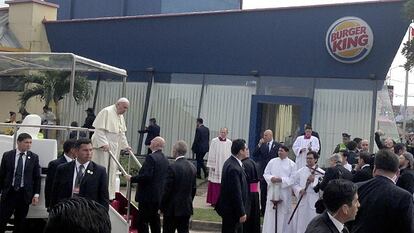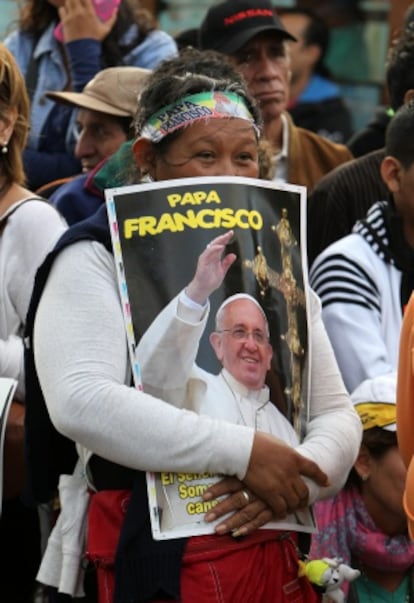Pope asks for forgiveness in Bolivia for “sins” committed during Conquest
“New colonialism always tightens belts of worker and the poor,” says pontiff Vatican officials taken aback by President Morales’ hammer and sickle crucifix gift

Pope Francis reached out to Latin America’s indigenous communities on Thursday to ask them for “forgiveness” for the crimes committed by the Catholic Church during the European conquest of the Americas.
In a sweeping speech given in Santa Cruz, Bolivia, where he was on a two-day visit, Francis attacked the new global economic order for having “no concern for social exclusion or the destruction of nature.”
Many grave sins were committed against the native peoples in the name of God ”
But it was his straightforward apology for the Church’s past record during colonialism that garnered the most attention.
“I say this to you with regret – many grave sins were committed against the native peoples of the Americas in the name of God [...]. I humbly ask forgiveness, not only for the offenses of the Church herself, but also for crimes committed against the native peoples during the so-called conquest of
America,” the pope said.
“There was sin and an abundant amount of it.”

For nearly an hour, the Argentinean-born pontiff listened to the testimonies of people from different social-exclusion sectors about their unfair treatment by society. They represented indigenous communities, junk collectors and workers from city outskirts who perform menial jobs.
President Evo Morales also joined in by filing a grievance with the pope with a fiery speech about the consequences of the conquest of the Americas. “In 1492, we suffered a European and Spanish invasion,” he said.
But it was the pope who seemed to be the most vocal when his turn came to speak about wealth and greed.
“Once capital becomes an idol and guides people’s decisions, once greed for money presides over the entire socioeconomic system, it ruins society, it condemns and enslaves men and women, it destroys human fraternity, it sets people against one another and, as we clearly see, it even puts our common home at risk.”
Bolivia was the second stop on the pope’s three-nation South American visit, which will also take him to Paraguay on Friday before he returns to the Vatican this weekend.
Since his arrival from Ecuador on Wednesday, the pope’s visit to Bolivia has spawned some controversies and curious moments.
Vatican officials acknowledged that they were taken aback by President Morales’s gift to the pope of a wooden crucifix shaped like a hammer and sickle.
The sculpture was made by a Jesuit priest, Luis Espinal Camps, a proponent of Libertarian Theology and supporter of miners’ rights, who was killed by a right-wing paramilitary squad in Bolivia in 1980.
One of the first to criticize the president’s gesture was Spanish Archbishop José Ignacio Munilla.
“The culmination of arrogance is to manipulate God for the service of atheist ideologies,” Munilla wrote on his Twitter account.
Vatican spokesman Father Federico Lombardi said that the Bolivian Jesuits assured him that this was “not a Marxist view” on religion.
“I don't think I would put this symbol on an altar in a church however,” Lombardi told reporters.
According to the Catholic News Agency, Francis was “not amused” by Morales’ gift and appeared to say “It is not okay” when it was presented to him.
Once capital becomes an idol and guides people’s decisions, it ruins
society ”
In another spontaneous moment captured by cameras on Thursday, Pope Francis popped in to a Burger King restaurant in Santa Cruz to change his vestments before celebrating an outdoor Mass in front of thousands of worshipers.
The manager of the local fast food outlet told reporters later that the pope’s entourage had asked him if they could use the establishment because “it was an appropriate place” where the pontiff could change his clothes. But they said that the restaurant had to be closed and specially purposed.
During the Mass, the pope spoke about the “new colonialism” of the new world order.
“At times it appears as the anonymous influence of mammon: corporations, loan agencies, certain ‘free trade’ treaties, and the imposition of measures of ‘austerity’ that always tighten the belt of workers and the poor,” he said.
Francis’ appeal for forgiveness for the Church’s “sins” during the conquest wasn’t the first time that a pope had apologized to the indigenous people of the Americas.
On October 13, 1992 during a visit to Santo Domingo, Dominican Republic, John Paul II asked for forgiveness for the unfair treatment by past popes during the evangelization of the Americas.
Fifteen years later, his successor Benedict XVI also recognized the “sufferings” of the Indigenous peoples at the hands of the colonists.
Tu suscripción se está usando en otro dispositivo
¿Quieres añadir otro usuario a tu suscripción?
Si continúas leyendo en este dispositivo, no se podrá leer en el otro.
FlechaTu suscripción se está usando en otro dispositivo y solo puedes acceder a EL PAÍS desde un dispositivo a la vez.
Si quieres compartir tu cuenta, cambia tu suscripción a la modalidad Premium, así podrás añadir otro usuario. Cada uno accederá con su propia cuenta de email, lo que os permitirá personalizar vuestra experiencia en EL PAÍS.
¿Tienes una suscripción de empresa? Accede aquí para contratar más cuentas.
En el caso de no saber quién está usando tu cuenta, te recomendamos cambiar tu contraseña aquí.
Si decides continuar compartiendo tu cuenta, este mensaje se mostrará en tu dispositivo y en el de la otra persona que está usando tu cuenta de forma indefinida, afectando a tu experiencia de lectura. Puedes consultar aquí los términos y condiciones de la suscripción digital.








































